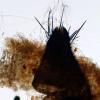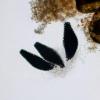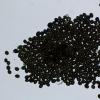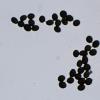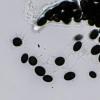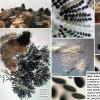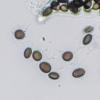
28-02-2026 14:43
A new refrence desired :Svanidze, T.V. (1984) Novy

01-03-2026 18:02
 Francois Guay
Francois Guay
I found this mystery Helotiales on an incubated le

01-03-2026 14:10
 Antonio Couceiro
Antonio Couceiro
Hola, me gustaria conocer opiniones sobre este tem

01-03-2026 18:46
 Robin Isaksson
Robin Isaksson
Hi! This species i se from time to time in the

01-03-2026 08:55
 Michel Hairaud
Michel Hairaud
Bonjour , Je souhaiterais recevoir cet article :�

01-03-2026 15:31
 Csaba Németh
Csaba Németh
Hello!I found these apothecia on Homalothecium lue

01-03-2026 17:51
 Bruno Coué
Bruno Coué
Bonjour,sur vieilles crottes de sanglier en chambr
Podospora - multispored
Chris Johnson,
17-02-2015 11:50
This was found a few days ago on pony dung. The first multispored Podospora I have found.
Perithecium 500 x 300 µm, partly immersed.
Hairs restricted to the neck, up to 150 µm long x 4-5 µm wide.
Three asci, 175-190 x 65-74 µm
Spores 9.6-11.8 x 6.5-9.1 µm, Me = 11.0 x 7.8 µm
The two spore images are from the same ascus and a careful count on a grid gives 440 plus an estimated 50-60 'double layered' provides an assumed mass of 512.
No additional perithecia have been found to date.
There are not too many species with 512 spores and they tend to have larger spores.
Any help welcome.
Best wishes, Chris
Michel Delpont,
17-02-2015 12:19

Re : Podospora - multispored
Hello Chris.
Could you make more accurate pictures of spores?
Michel.
Could you make more accurate pictures of spores?
Michel.
Chris Johnson,
17-02-2015 13:17
Chris Yeates,
17-02-2015 14:08

Re : Podospora - multispored
It doesn't say Podospora to me based on what I can see here - did it definitely have a pedicel? appendages?
The spores call to mind Coniochaeta; any sign of a germ slit? As Michel has pointed out better spore images would be desirable; hopefully more perithecia will appear in due course
best wishes
Chris
The spores call to mind Coniochaeta; any sign of a germ slit? As Michel has pointed out better spore images would be desirable; hopefully more perithecia will appear in due course
best wishes
Chris
Michel Delpont,
17-02-2015 14:33

Re : Podospora - multispored
I also thought the genre Coniochaeta but no distinction germination slot. There are several species of Coniochaeta coprophilous with polysporés asci. Hopefully more details with more photos.
Michel.
Michel.
Chris Johnson,
17-02-2015 17:25
Re : Podospora - multispored
Hi Chris and Michel
I didn't observe any germ splits through the microscope but I will lighten a couple of images to see what that reveals. No obvious pedicels noted - Podospora was an assumption on my part.
Thanks, Chris
I didn't observe any germ splits through the microscope but I will lighten a couple of images to see what that reveals. No obvious pedicels noted - Podospora was an assumption on my part.
Thanks, Chris
Chris Yeates,
18-02-2015 02:43

Re : Podospora - multispored
Hello Chris
your images seem to suggest rather flattened spores - such as you find in Coniochaeta
see for example: http://www.ascofrance.fr/search_recolte/2621
and the image below; admittedly a lot harder with multispored asci such as you have encountered
Chris
your images seem to suggest rather flattened spores - such as you find in Coniochaeta
see for example: http://www.ascofrance.fr/search_recolte/2621
and the image below; admittedly a lot harder with multispored asci such as you have encountered
Chris
Chris Johnson,
18-02-2015 11:09
Re : Podospora - multispored
Hi Chris
I have lightened one of the images and the details seem to bear out what you are saying.
Searching the literature, I can only find one species with 512 spores: Coniochaeta polysperma, which is not on the British list.
Lets hope for some more specimens.
Regards, Chris
I have lightened one of the images and the details seem to bear out what you are saying.
Searching the literature, I can only find one species with 512 spores: Coniochaeta polysperma, which is not on the British list.
Lets hope for some more specimens.
Regards, Chris

